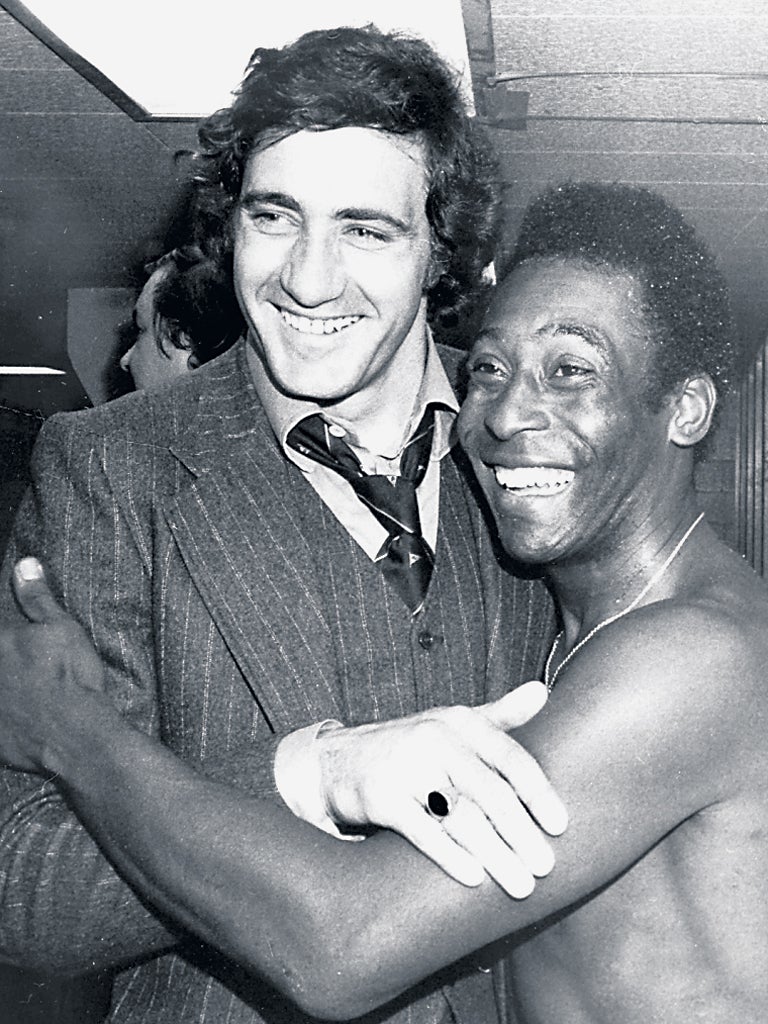Giorgio Chinaglia: Striker for Lazio, Italy and New York Cosmos

Giorgio Chinaglia was fond of saying that his head was as strong as the marble produced in his birthplace of Carrara, in Tuscany, but the goalscoring prowess that earned him the centre-forward's role for Italy in the 1974 World Cup, as well as making him a prolific marksman for Lazio and alongside Pele at New York Cosmos, had inauspicious beginnings on the playing fields of South Wales.
In 1955, when Chinaglia was eight, his jobless father, Mario, uprooted the family to Cardiff, where he had successfully applied for a job in a steelworks. At first, however, emigration did little for Chinaglia's progress as a footballer, for the Catholic schools he attended into his mid-teens were biased towards rugby. When he escaped the rigours of the second row, the rangy six-footer impressed sufficiently to be selected for the Cardiff team which reached the semi-finals of the English Schools Shield in 1961-62. Attracting the attention of Second Division Swansea Town (as the current Premier League club were called), he became an apprentice professional in the summer of 1962.
Chinaglia would spend four unfulfilling years at Swansea, seldom hinting at the raw power and single-minded striking that led him to Rome, New York, wealth and notoriety. Few doubted he had something – the Western Mail ventured he "could develop into another John Charles" – but there was an arrogance that grated on senior colleagues. At 16, he was playing pranks in the dressing room and gaining a reputation as a gambler.
After cutting his teeth in the youth team against clubs such as Mumbles Rangers and Dilwyn Athletic, he graduated to the Welsh League at venues like Haverfordwest and Bridgend, where the defenders took "marking" duties literally. In February 1965, when he was still waiting for his League debut, Chinaglia berated manager Trevor Morris about his lack of opportunities, insisting that Juventus, Torino and Bologna were interested.
The claim must have seemed risible, yet after the 18-year-old's four-goal spree against Pembroke Borough, Morris picked him against Portsmouth. He flopped. Over the next 15 months he would play only five more times, his final appearance coming in a 6-1 home rout by Workington as the club slid towards the Fourth Division. In the summer of England's World Cup triumph, Swansea released him.
Years later, portraying his spell at the Vetch Field as "drinking ale and slogging it out in the mud", he added: "Best thing they ever did was give me a free transfer. It changed my life, and I'll always thank Swansea for that." After a failed trial with his home-town team, Carrarese, he joined Serie C rivals Massese, later moving to Internapoli, where his free scoring led him to Lazio in 1969.
Chinaglia, though recruited by an Argentinian coach, Juan Carlos Lorenzo, finally fulfilled his potential under the tweed-jacketed Tommaso Maestrelli, contributing 21 goals to promotion from Serie B in 1971-72. The last of his 24 goals in 1973-74, a cool penalty in a jittery stalemate against Foggia when even the hardcore fans on the Curva Nord were afraid to look, gave the club their first Italian championship. Engulfed by team-mates, he broke free to embrace Maestrelli.
Former Juventus player Omar Sivori branded him "an elephant in a china shop". Others said all he did was score goals. Chinaglia responded: "They say I'm only a finisher. But when I'm finished with the ball, it's in the net." He represented Italy 14 times, scoring four goals and creating the winner for Fabio Capello against England at Wembley in 1973. But the following year, after being substituted against Haiti during the World Cup finals, his volatility resurfaced when he made an obscene gesture and kicked down the changing-room door. He was never chosen again.
Maestrelli's death in 1976 fed Chinaglia's growing disenchantment with Italian football, and when his American wife returned to the US to raise their children there, he decided to follow, aged 28, after 98 goals in 209 matches for Lazio. The Cosmos, spotting an opportunity to woo New York's Italian community, bought him for a knock-down $750,000. His salary, $80,000 a year, was an eighth of what Pele was paid, but Chinaglia soon moved into a 14-bedroom mansion in New Jersey.
Among his colleagues was Dennis Tueart, the English attacker who told Backpass magazine this year: "Chinaglia was our leader. He had an ego the size of the Big Apple, but he just wanted to score goals and win games." Feeding off Pele's creativity before the Brazilian retired, he collected 193 goals in 213 games and helped the Cosmos win four North American Soccer League titles.
Chinaglia became a US citizen in 1979, but returned to Italy to become president of Lazio from 1983 to 1985. At the time of his death, from a second heart attack in the space of a week, he was co-hosting a daily football show on American radio.
Giorgio Chinaglia, footballer: born Carrara, Italy 24 January 1947; played for Swansea Town 1964-66, Massese 1966-67, Internapoli 1967-69, Lazio 1969-76, New York Cosmos 1976-83; capped 14 times by Italy; married twice (three sons, two daughters); died Naples, Florida 1 April 2012.
Join our commenting forum
Join thought-provoking conversations, follow other Independent readers and see their replies
Comments
Bookmark popover
Removed from bookmarks